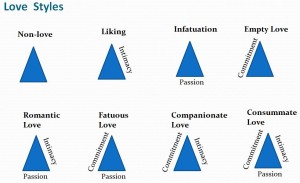Should I Stay or Should I Go? Part 3 – How Unhappy Do I Have to Be to Justify Divorce?
By Jamie C. Williamson, PhD
One of the main reasons people in contemporary western culture get stuck in what I call the Contemplative Phase of divorce is that the purpose of marriage itself has evolved over the last few decades, leaving people confused about what they value most from what should be the most valuable relationship in their life.
 They can’t distinguish their sense of obligation from their once loving commitment. They can’t figure out how their best friend became a stranger. They desperately want to be happy AND do the right thing. So, they are left wondering, “how unhappy do I have to be in order to justify divorce?”
They can’t distinguish their sense of obligation from their once loving commitment. They can’t figure out how their best friend became a stranger. They desperately want to be happy AND do the right thing. So, they are left wondering, “how unhappy do I have to be in order to justify divorce?”
Ideal marriage is no longer characterized as a traditional (and very practical) exchange relationship, where the husband is head of the household and provides for the economic well being of the wife who keeps the home fires burning. Instead, as more women earned college degrees, developed careers, and exercised their family planning options, men and women began to marry primarily for love, along with mutual interests, dual incomes (unless they decide otherwise), and shared decision making, parenting and household responsibilities.
Today, the fairy tale marriage includes spouses who are lovers, friends, and committed equal partners.
Most couples know to expect temporary changes in their relationship due to work pressure, the introduction of children to the relationship, and other life events. However, when couples experience a serious, long-lasting deficiency in the intimacy, passion, or commitment they once shared, they sense that their marriage love style has changed, prompting either or both of them to contemplate divorce.
Imagine it…..you took a vow. Made a commitment. And, likely married someone who was once your best friend. Things changed. You miss the loving relationship you once shared. And, you have done all you know how to do to revitalize your marriage. The improvements didn’t last.
So, now you wonder….
“How unhappy do I have to be in order to justify initiating a divorce?”
This post is the third and final post in a three-part series focused the way you and your spouse display intimacy, commitment and passion to create your Marriage Love Style, which can evole over time. For more detail and the questions that help you assess your own relationship, read the first two posts in the Should I Stay or Should I Go series.
Robert Sternberg used the concepts of intimacy, commitment, and passion to articulate his powerfully descriptive Triangle Theory of Love, which illustrates eight Love Styles. I expand his theory by using the three dimensions of love and the Love Styles as a guide for making decisions about marriage and divorce.
Let’s review the Love Styles below, keeping in mind that each of the dimensions run along a continuum from low to high. You can mark your level on a triangle, create your own unique marriage Love Style, and use the diagrams below to determine the Love Style that most closely matches your marriage.

Now, reflect back on your wedding day and the early stage of your marriage. What Love Style best characterized your marriage at that time?
What Love Style best characterizes your marriage now?
How has your marriage Love Style changed over time? (If you haven’t already done these assessments, you can find the questions here).
And, now the hard part.
First: Determine how your current Marriage Love Style impacts your level of satisfaction with your marriage. On a scale of 1 (very dissatisfied) to 7 (very satisfied). How satisfied are you with the current state of your marriage love style?
Second: Distinguish between your satisfaction with your Marriage Love Style and your own personal level of happiness. For example, you could be experiencing a lower level of intimacy and passion than optimal, but you just adopted a baby and so, despite the change in love style, you are personally happy. Or your spouse just got a new job, so you understand why she is preoccupied and are happy being supportive during this change. On the other hand, you could be experiencing a much lower level of intimacy and passion that has lasted a few years without a reasonable explanation. You’re married, but feel alone in your own home. As a result, you are personally very unhappy.
Third: Identify the problem (even if it is you) and make changes. Make sincere attempts to reconcile differences and do all you know how to do to improve the relationship and prevent its failure. (Stay tuned for future blogs on this critically important step.)
Four: Revisit your satisfaction meter. Did your attempts to improve the relationship have a meaningful impact? Or does the relationship continue to cause you distress? Prevent you from growing? Demoralize you?
Five: Decide and take deliberate action either way. If you are knowingly stuck in failed relationship, you are voluntarily choosing not to be as happy as you could be. And, be assured, you are selfishly keeping your spouse from being truly happy, as well. You’re both living the marriage equivalent of a glass half empty. If you stay, know you have to commit to being “all in” or there is little chance you will restore the joy in your marriage or reach the red line on your own happiness meter.
This concludes our three-part “Should I Stay or Should I Go?” series. Please take the time to read all three posts and reflect carefully on the concepts and questions asked. And, then decide what is best for you, your spouse, and your children, if you have them.
As you finalize your decision, let me leave you with one of my favorite commentaries how to decide whether or not to end a marriage. Leo Buscaglia penned it over 30 years ago, but it is timeless:
“The very measure of a good relationship is in how much it encourages optimal intellectual, emotional and spiritual growth. So, if a relationship becomes destructive, endangers our human dignity, prevents us from growing, continually depresses and demoralizes us — then, unless we are masochists and enjoy misery, we must eventually terminate it. We are not for everyone and everyone is not for us. The question is,
“if we cannot be with another, can we at least not hurt them? Can we, at least, find a way to coexist?”
At Amity, we adopted a guiding philosophy of civility and a friendly approach to facilitating conversations that permeates our work. And we embrace an optimism about what people can do with and for each other, if they are simply willing to focus on finding solutions that are good for them AND for the others involved in their issues, especially children.
We know that most couples and families truly value peaceful resolution of issues with as little hurt to those involved as possible. We hope couples can stay together. But, our goal is to help people eliminate distress in their relationships and maintain peace, whether they stay together or not.
Our approach supports and guides individuals as they work to settle their differences and define for themselves the future of their relationships. If you are ready, share all of this with your spouse. Then, start to Work it Out.
And, let me know if I can help.
Like our Facebook page to receive notices of future blog posts.
